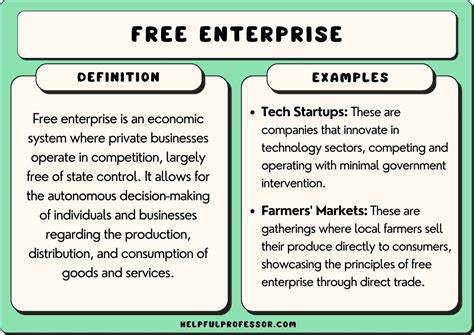What Is Free Enterprise

The concept of free enterprise is a fundamental aspect of modern economies, emphasizing the freedom of individuals and businesses to operate with minimal government interference. At its core, free enterprise is an economic system where private entities, rather than the government, own and operate the means of production, distribution, and exchange of goods and services. This system is characterized by the principles of voluntary exchange, competition, and profit motive, which drive innovation, efficiency, and economic growth.
Free enterprise systems are often contrasted with centrally planned economies, where the government plays a significant role in directing economic activity. In a free enterprise system, individuals and businesses are free to pursue their own economic interests, as long as they operate within the framework of the law. This freedom to innovate, invest, and take risks is seen as a key driver of economic progress and prosperity. The United States, for example, is often cited as a prime example of a free enterprise economy, where private businesses and individuals are encouraged to innovate and compete in a relatively unregulated environment.
Key Points
- Free enterprise is an economic system characterized by private ownership and operation of the means of production.
- The system is driven by the principles of voluntary exchange, competition, and profit motive.
- Free enterprise promotes innovation, efficiency, and economic growth by allowing individuals and businesses to pursue their own economic interests.
- This system is often contrasted with centrally planned economies, where the government plays a significant role in directing economic activity.
- Examples of free enterprise economies include the United States, where private businesses and individuals are encouraged to innovate and compete in a relatively unregulated environment.
Characteristics of Free Enterprise

A free enterprise system has several key characteristics that distinguish it from other economic systems. These include private property rights, freedom of choice, competition, and the profit motive. Private property rights refer to the ability of individuals and businesses to own and control the means of production, such as land, labor, and capital. Freedom of choice allows individuals and businesses to decide what goods and services to produce, how to produce them, and at what price to sell them. Competition, which arises from the interactions of many buyers and sellers in a market, drives innovation and efficiency by encouraging businesses to improve their products and services. The profit motive, which is the desire to earn a profit, provides an incentive for individuals and businesses to innovate and take risks.
Private Property Rights
Private property rights are a fundamental aspect of free enterprise, as they allow individuals and businesses to own and control the means of production. This includes the right to buy, sell, and use property as they see fit, as long as they do not harm others. Private property rights provide an incentive for individuals and businesses to invest in and maintain their property, which can lead to increased productivity and efficiency. For example, a farmer who owns their land is more likely to invest in its maintenance and improvement, which can lead to increased crop yields and profitability.
| Characteristics of Free Enterprise | Description |
|---|---|
| Private Property Rights | The right to own and control the means of production. |
| Freedom of Choice | The ability to decide what goods and services to produce, how to produce them, and at what price to sell them. |
| Competition | The interaction of many buyers and sellers in a market, which drives innovation and efficiency. |
| Profit Motive | The desire to earn a profit, which provides an incentive for individuals and businesses to innovate and take risks. |

Advantages of Free Enterprise

Free enterprise systems have several advantages that make them attractive to individuals and businesses. These include increased innovation, efficiency, and economic growth, as well as improved standards of living and greater freedom. The profit motive and competition drive businesses to innovate and improve their products and services, which can lead to increased productivity and efficiency. Additionally, free enterprise systems allow individuals and businesses to pursue their own economic interests, which can lead to increased economic growth and prosperity. For example, the technology industry in the United States has driven innovation and economic growth through the creation of new products and services, such as smartphones and social media platforms.
Increased Innovation
The profit motive and competition in free enterprise systems drive businesses to innovate and improve their products and services. This can lead to the creation of new industries, jobs, and opportunities, which can drive economic growth and prosperity. For example, the development of the internet and e-commerce has created new opportunities for businesses to reach customers and sell products, which has driven economic growth and innovation.
What is the main advantage of free enterprise?
+The main advantage of free enterprise is increased innovation, efficiency, and economic growth, which can lead to improved standards of living and greater freedom.
How does free enterprise promote economic growth?
+Free enterprise promotes economic growth by allowing individuals and businesses to pursue their own economic interests, which can lead to increased innovation, efficiency, and productivity.
What are the key characteristics of free enterprise?
+The key characteristics of free enterprise include private property rights, freedom of choice, competition, and the profit motive.
In conclusion, free enterprise is an economic system that promotes innovation, efficiency, and economic growth by allowing individuals and businesses to pursue their own economic interests. The combination of private property rights, freedom of choice, competition, and the profit motive creates a powerful incentive for innovation and economic growth. While free enterprise systems have several advantages, they also have limitations and challenges, such as income inequality and market failures. However, by understanding the principles and characteristics of free enterprise, individuals and businesses can make informed decisions and contribute to economic growth and prosperity.